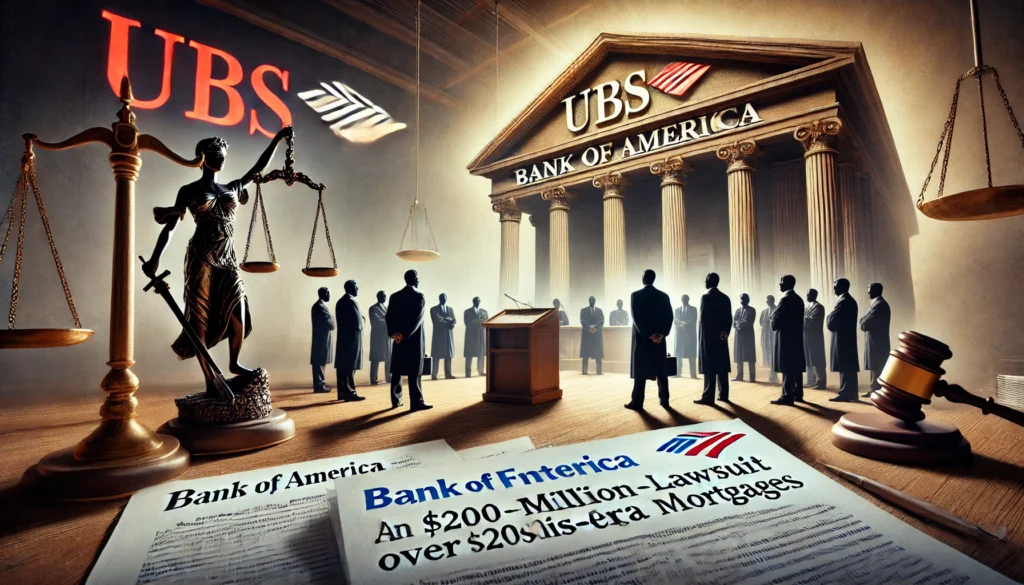In a significant development in the financial world, Bank of America faces a new lawsuit from UBS, with the latter demanding $200 million in compensation for legal expenses and claims arising from mortgage-related issues dating back to the 2008 financial crisis. The lawsuit focuses on the indemnification agreement between UBS and Countrywide Financial, a company that Bank of America acquired during the crisis. This article explores the key details of the lawsuit, its background, and the potential consequences for both banks and the financial sector.
Background of the Dispute
To fully understand the lawsuit, it’s important to look at the broader context, which revolves around the 2008 financial crisis. During this time, many financial institutions were heavily involved in the creation and sale of mortgage-backed securities, which were often backed by risky or subprime mortgages. One of the major players in issuing these loans was Countrywide Financial, a company notorious for offering high-risk mortgages.
UBS and Mortgage-Backed Securities
UBS, as a large financial institution, had a significant involvement in the trading of mortgage-backed securities before the 2008 financial crisis. The securities were made up of bundles of home loans, many of which were poorly underwritten or even fraudulent. As the housing market collapsed and mortgage defaults soared, these securities lost much of their value, leading to huge financial losses for many investors, including UBS. In 2013 and 2016, UBS reached major settlements, paying billions of dollars to resolve claims related to these toxic mortgage securities.
Bank of America’s Acquisition of Countrywide
In 2008, amidst the financial crisis, Bank of America acquired Countrywide Financial, which was then facing severe financial problems due to its aggressive and often reckless lending practices. The acquisition meant that Bank of America inherited Countrywide’s legal liabilities, including lawsuits stemming from its mortgage practices. This acquisition would later become the focal point of various legal challenges, including the ongoing lawsuit filed by UBS.
Bank of America Faces a New Lawsuit from UBS: Understanding the $200 Million Legal Dispute
In a significant legal development, Bank of America faces a new lawsuit from UBS, demanding $200 million in damages over mortgage-related claims dating back to the 2008 financial crisis. This case highlights unresolved issues from the financial meltdown and sheds light on the complex legal and financial relationships between global banks.
The dispute stems from an indemnification agreement made before the crisis. UBS claims that Countrywide Financial, a company Bank of America acquired in 2008, had agreed to cover legal costs and claims tied to its risky mortgage practices. These mortgages were part of the subprime market that played a major role in triggering the crisis. UBS alleges that Bank of America, as the successor to Countrywide, has failed to honor this agreement, leaving UBS to bear significant legal expenses.
The $200 million claim includes $53 million in legal fees that UBS says it incurred while defending itself against lawsuits connected to Countrywide’s poorly underwritten and fraudulent loans. If successful, UBS could recover a substantial portion of its crisis-era losses, while Bank of America could face both financial and reputational consequences.
This lawsuit serves as a reminder of the lasting impact of the 2008 financial crisis. It underscores how unresolved legal disputes and financial liabilities continue to affect banks and the broader financial sector more than a decade later. Whether UBS wins or loses, this case could set an important precedent for how indemnification agreements are enforced in the future.
Details of the Lawsuit
Legal Basis
UBS’s lawsuit centers around an indemnification agreement that was in place between UBS and Countrywide. Essentially, this agreement stipulated that Countrywide would cover any legal costs or damages resulting from claims related to its subprime mortgage practices. In other words, if any legal trouble arose due to Countrywide’s actions, the company would take responsibility and reimburse UBS for any costs incurred.
When Bank of America acquired Countrywide, it assumed responsibility for Countrywide’s obligations. UBS now claims that Bank of America, as the new owner of Countrywide, has not honored these indemnification obligations. UBS argues that Bank of America should cover the legal costs related to the mortgage claims that are still ongoing, including the $53 million in legal expenses UBS has already paid. In total, UBS is seeking $200 million in compensation, a significant amount that reflects both the scale of the costs and the long-term impact of the legal fallout.
The Financial Claims
The lawsuit is not just about recovering legal fees; it also highlights the ongoing financial burden that UBS has faced due to Countrywide’s actions. The financial markets were severely impacted by the wave of defaults and foreclosures that resulted from Countrywide’s lending practices. As a result, UBS has had to deal with a series of legal claims, including those related to mortgage-backed securities and other financial products tied to risky loans.
UBS is asking for $200 million, which includes the $53 million it has already spent on legal costs and additional expenses related to defending itself against claims connected to the 2008 crisis. The lawsuit underscores the immense financial and legal burden that the crisis continues to impose on institutions like UBS, despite having settled similar issues years ago.
Allegations Against Bank of America
At the heart of the lawsuit is the accusation that Bank of America has failed to uphold its contractual obligations as the successor to Countrywide. UBS claims that, by refusing to cover the legal costs associated with the mortgage-related claims, Bank of America is breaching its indemnification agreement. According to UBS, the bank should be financially responsible for the costs, as it now owns the liabilities and assets that Countrywide once held.
This is a serious allegation, as it touches on the fundamental issue of financial responsibility in the aftermath of the crisis. If UBS is successful, it could result in substantial financial penalties for Bank of America. Furthermore, it could send a message to other institutions about the importance of honoring indemnification agreements and the risks of inheriting another company’s legal liabilities.
Implications of the Lawsuit
For Bank of America
If Bank of America loses the lawsuit, it could face both financial and reputational damage. The $200 million in claims is just one part of the potential fallout. If the court finds in favor of UBS, Bank of America might have to pay additional costs related to the mortgage-related claims, further increasing its financial burden. Additionally, the bank could suffer a blow to its reputation, especially considering the public perception of the 2008 financial crisis and its aftermath.
The lawsuit could also have broader implications for Bank of America’s future dealings with other institutions. It might make potential partners and investors more cautious about the bank’s financial obligations and its commitment to fulfilling past agreements. Given the size of the claim and the nature of the lawsuit, this case could be a turning point for the bank in terms of its legal and financial standing.
For UBS
For UBS, the lawsuit represents an effort to recover the costs it has incurred in defending itself against claims related to Countrywide’s risky mortgage practices. If UBS succeeds, it will not only recover some of its losses but also set a precedent for other companies that may find themselves in similar situations. As one of the largest financial institutions in the world, UBS has a strong interest in ensuring that it is not left to bear the financial burden of the mistakes made by other companies, especially when indemnity agreements are in place.
For the Financial Sector
The lawsuit between UBS and Bank of America has wider implications for the financial sector. It serves as a reminder that the 2008 financial crisis is still affecting institutions today. Many legal battles, such as this one, are based on contracts, indemnifications, and other financial agreements made during the crisis. These cases show that, even years after the event, the financial sector is still grappling with the fallout from the subprime mortgage market collapse.
Moreover, the case could set important precedents for how indemnity agreements are interpreted and enforced in future legal disputes. This could influence how other companies approach risk management, mergers, and acquisitions in the future.
Context: Mortgage-Backed Securities and the 2008 Financial Crisis
To truly understand the depth of the issue, it’s important to revisit the 2008 financial crisis, which remains one of the most significant economic events in recent history. The crisis was triggered by the collapse of the subprime mortgage market. Many financial institutions, including Countrywide, issued high-risk loans to borrowers who were unlikely to repay them. These loans were then bundled into mortgage-backed securities and sold to investors around the world.
When housing prices fell and borrowers began to default on their loans, the mortgage-backed securities lost value. This caused a chain reaction, leading to the collapse of Lehman Brothers and other major financial institutions, as well as the global recession. UBS and Bank of America were both deeply involved in this market, and the legal challenges arising from their involvement continue to this day.
Legal and Financial History Between UBS and Bank of America
This is not the first legal dispute between UBS and Bank of America related to the 2008 crisis. Over the years, both institutions have faced lawsuits and penalties for their role in the financial meltdown. UBS, for example, has already paid billions in settlements over mortgage-backed securities and other financial products linked to risky loans. Bank of America, on the other hand, has faced numerous lawsuits due to its acquisition of Countrywide, and this latest lawsuit is another chapter in that ongoing legal saga.
Conclusion
The fact that Bank of America faces a new lawsuit from UBS underscores the lasting impact of the 2008 financial crisis. It serves as a reminder that the financial sector is still dealing with the consequences of the reckless mortgage practices that led to the crisis. Whether or not UBS is successful in its lawsuit, the case highlights the complex web of legal, financial, and reputational challenges that financial institutions continue to face.
For Bank of America, this lawsuit is just one of many related to its acquisition of Countrywide. For UBS, it is an opportunity to recover some of the legal costs incurred during the crisis. Regardless of the outcome, this case will likely influence future legal and financial decisions in the industry, making it a significant development for both banks and the broader financial sector.
FAQs
Why is UBS suing Bank of America?
UBS claims Bank of America failed to honor an indemnification agreement tied to legal costs from risky mortgages issued by Countrywide.
What is UBS seeking in the lawsuit?
UBS is demanding $200 million in damages, including $53 million in legal fees related to crisis-era mortgage claims.
What is the significance of Countrywide in this case?
Countrywide, acquired by Bank of America in 2008, is accused of issuing fraudulent and poorly underwritten mortgages before the financial crisis.
How does this lawsuit affect Bank of America?
If UBS wins, Bank of America faces financial and reputational harm, potentially setting a precedent for similar cases.
What impact could this case have on the financial sector?
The lawsuit highlights unresolved issues from the 2008 crisis and could influence the future handling of indemnification agreements in mergers.
Article Recommendations
Diddy Lawsuit Lil Rod Documents: How This Case Could Reshape Legal Practices
Wingate Wilderness Therapy Lawsuit: How Legal Scrutiny Shapes the Future of Wilderness Therapy
Endurance Warranty Lawsuit: Essential Tips for Protecting Yourself from Contract Misunderstandings




